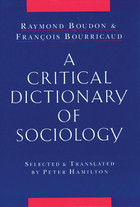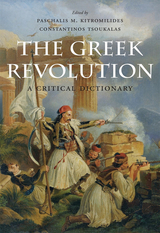

Two centuries later, the French Revolution—that extraordinary event that founded modern democracy—continues to give rise to a reevaluation of essential questions. The ambition of this magnificent volume is not only to present the reader with the research of a wide range of international scholars on those questions, but also to bring one into the heart of the issues still under lively debate.
Its form is as original as its goal: neither dictionary, in the traditional sense of the word, nor encyclopedia, it is deliberately limited to some ninety-nine entries organized alphabetically by key words and themes under five major headings: events, including the Estates General and the Terror; actors, such as Marie Antoinette, Marat, and Napoleon Bonaparte; institutions and creations, among them Revolutionary Calendar and Suffrage; ideas, covering, for example, Ancien Régime, the American Revolution, and Liberty; and historians and commentators, from Hegel to Tocqueville. In addition, there are synoptic indexes of names and themes that give the reader easy access to the entire volume as well as a key to its profound coherence.
What unifies all the varied topics brought together in this dictionary is their authors’ effort to be “critical.” As such, the book rejects the dogmatism of closed systems and definitive interpretations. Its aim is less to make a complete inventory of the findings of the history of the French Revolution than to take stock of what remains problematical about those findings; this work thus offers the additional special quality of incorporating the rich historiographical literature unceasingly elaborated since 1789.
With A Critical Dictionary of the French Revolution, François Furet and Mona Ozouf invite the reader to recross the first two centuries of French democracy in order to gain a better understanding of the origins of the world in which we live today.

Winner of the 2022 London Hellenic Prize
On the bicentennial of the Greek Revolution, an essential guide to the momentous war for independence of the Greeks from the Ottoman Empire.
The Greek war for independence (1821–1830) often goes missing from discussion of the Age of Revolutions. Yet the rebellion against Ottoman rule was enormously influential in its time, and its resonances are felt across modern history. The Greeks inspired others to throw off the oppression that developed in the backlash to the French Revolution. And Europeans in general were hardly blind to the sight of Christian subjects toppling Muslim rulers. In this collection of essays, Paschalis Kitromilides and Constantinos Tsoukalas bring together scholars writing on the many facets of the Greek Revolution and placing it squarely within the revolutionary age.
An impressive roster of contributors traces the revolution as it unfolded and analyzes its regional and transnational repercussions, including the Romanian and Serbian revolts that spread the spirit of the Greek uprising through the Balkans. The essays also elucidate religious and cultural dimensions of Greek nationalism, including the power of the Orthodox church. One essay looks at the triumph of the idea of a Greek “homeland,” which bound the Greek diaspora—and its financial contributions—to the revolutionary cause. Another essay examines the Ottoman response, involving a series of reforms to the imperial military and allegiance system. Noted scholars cover major figures of the revolution; events as they were interpreted in the press, art, literature, and music; and the impact of intellectual movements such as philhellenism and the Enlightenment.
Authoritative and accessible, The Greek Revolution confirms the profound political significance and long-lasting cultural legacies of a pivotal event in world history.
READERS
Browse our collection.
PUBLISHERS
See BiblioVault's publisher services.
STUDENT SERVICES
Files for college accessibility offices.
UChicago Accessibility Resources
home | accessibility | search | about | contact us
BiblioVault ® 2001 - 2024
The University of Chicago Press









